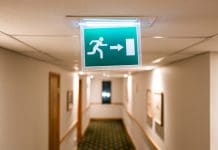Are you the appointed ‘Responsible Person’ for fire safety? BAFE outline how to ensure you implement strong measures to reduce the risk of fire on your site
Third-party certification is an option to all fire protection companies to provide evidence of their quality working practices and to demonstrate their ability to perform specific skilled tasks to a high standard.
The responsible person, if not appointed, becomes the employer/the person who controls the premises by default in the Regulatory Reform (Fire Safety) Order 2005. If you are unsure who controls your premises, this needs to be addressed to ensure you are not under any risk from fire and to establish who holds responsibility.
Being on site is a lot safer with the right fire safety measures in place. This is covered first and foremost by a fire risk assessment. Within current legislation, anybody can provide a fire risk assessment, and you are permitted to provide your own company assessment if you feel confident you can fulfil this. However, you can only identify risks you are aware of and how can you be sure you have provided an appropriate assessment according to the law? If the assessment is thought to have been carried out to an insufficient extent, the responsible person can face an unlimited fine or up to two years in prison.
If you are not 100% sure in your ability to provide this, ensure you have used skilled providers who will administer the vital task of completing a fire risk assessment. It is recommended that you use a third-party certified company for any services when it comes to protecting your business at work. Third-party certification is an option to all fire protection companies to provide evidence of their quality working practices and to demonstrate their ability to perform specific skilled tasks to a high standard. Using one of these certified companies shows in turn that you have acted with due diligence to provide a safe environment to work in.
The Regulatory Reform (Fire Safety) Order 2005 and the equivalent legislation in Scotland and Northern Ireland, places specific duties on the responsible person and DCLG states in its guidance documents (section 8):
“Third-party certification schemes for fire protection products and related services are an effective means of providing the fullest possible assurances, offering a level of quality, reliability and safety that non-certificated products may lack.”
The use of third-party certified maintenance providers for fire systems is enormously valued to help ensure an ongoing safe area to work in. It may be no issue for planners and specifiers to do their job and meet the regulations, but what happens next if the products and systems are not properly maintained?
Unlike security systems which are regularly switched off on opening the premises and switched on again on leaving, fire systems are on all the time – and sometimes overlooked. By making sure that everything is in order, there will be a much-reduced risk of false activations and that they will work at the most critical times to protect life and property.
Fire and Rescue Services are now beginning to take serious action against companies who have a fire incident and are without any fire risk assessment or evidence of adequate fire protection.
Stephen Adams, Chief Executive of BAFE, told Planning and Building Control Today he hopes that ongoing convictions will act as a deterrent and make companies take their responsibilities seriously:
“People are being fined, serious action is now being taken, and that’s getting up to the Crown Court and the High Court,” he said. “Hopefully customers are beginning to realise that they do have obligations.”
So where can help be found? BAFE is the independent, not for profit, third party certification registration body for quality in the UK fire protection industry. BAFE provides end users, such as appointed responsible persons and property managers, with an easy method of finding third-party certified fire protection companies.
All UK fire legislation can be found online and states what provisions need to be in place for all non-domestic properties. Once an organisation has established a quality fire safety policy, it’s every bit as important that this policy is then regularly updated, and the systems maintained. Fire extinguishers must be serviced regularly. Fire detection and alarm/emergency lighting systems have to be maintained and tested, while the all-important fire risk assessment must be reviewed and updated whenever there’s a change to the building, or the purpose of a given room or space is altered. All of these provisions are accountable by the responsible person.
For more information on third party certification or to find a BAFE approved company near you, please visit www.bafe.org.uk
BAFE
0844 335 0897
info@bafe.org.uk
www.bafe.org.uk
Twitter @BAFEFIRE




![[Video] Fireco: 80 new fire doors required for residential flats in London](https://www.pbctoday.co.uk/news/wp-content/uploads/2025/04/2024-06-01-Lords-view-one_1200x750_004-218x150.webp)
![[VIDEO] Making DorTrak reports easy to read with Fireco Inspecting fire doors at Fireco, firedoor technology, 2023](https://www.pbctoday.co.uk/news/wp-content/uploads/2024/04/JPZ_2364-web-218x150.jpg)







